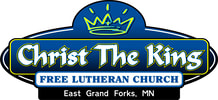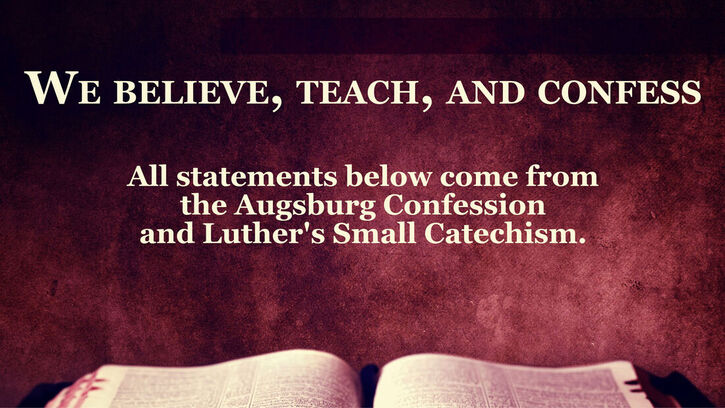The texts quoted below are from Triglot Concordia: The Symbolical Books of the Evangelical Lutheran Church: German-Latin-English which is in the public domain. To view the entirety of the Augsburg Confession and Small Catechism which Christ the King holds as a "true expression of the Christian faith and life," click here.
God
[We] teach that the decree of the Council of Nicaea concerning the Unity of the Divine Essence and concerning the Three Persons, is true and to be believed without any doubting; that is to say, there is one Divine Essence which is called and which is God: eternal, without body, without parts, of infinite power, wisdom, and goodness, the Maker and Preserver of all things, visible and invisible; and yet there are three Persons, of the same essence and power, who also are coeternal, the Father, the Son, and the Holy Ghost. And the term "person" they use as the Fathers have used it, to signify, not a part or quality in another, but that which subsists of itself (AC I. par. 1-4)
Sin
[We] teach that since the fall of Adam all men begotten in the natural way are born with sin, that is, without the fear of God, without trust in God, and with concupiscence; and that this disease, or vice of origin, is truly sin, even now condemning and bringing eternal death upon those not born again through Baptism and the Holy Ghost (AC II. par. 1-2).
Of the Son of God
[We] teach that the Word, that is, the Son of God, did assume the human nature in the womb of the blessed Virgin Mary, so that there are two natures, the divine and the human, inseparably enjoined in one Person, one Christ, true God and true man, who was born of the Virgin Mary, truly suffered, was crucified, dead, and buried, that He might reconcile the Father unto us, and be a sacrifice, not only for original guilt, but also for all actual sins of men.
He also descended into hell, and truly rose again the third day; afterward He ascended into heaven that He might sit on the right hand of the Father, and forever reign and have dominion over all creatures, and sanctify them that believe in Him, by sending the Holy Ghost into their hearts, to rule, comfort, and quicken them, and to defend them against the devil and the power of sin.
The same Christ shall openly come again to judge the quick and the dead, etc., according to the Apostles' Creed (AC III. par. 1-6).
He also descended into hell, and truly rose again the third day; afterward He ascended into heaven that He might sit on the right hand of the Father, and forever reign and have dominion over all creatures, and sanctify them that believe in Him, by sending the Holy Ghost into their hearts, to rule, comfort, and quicken them, and to defend them against the devil and the power of sin.
The same Christ shall openly come again to judge the quick and the dead, etc., according to the Apostles' Creed (AC III. par. 1-6).
Justification
[We] teach that men cannot be justified before God by their own strength, merits, or works, but are freely justified for Christ's sake, through faith, when they believe that they are received into favor, and that their sins are forgiven for Christ's sake, who, by His death, has made satisfaction for our sins. This faith God imputes for righteousness in His sight. Rom. 3 and 4 (AC IV. par. 1-3).
The Ministry
That we may obtain this faith, the Ministry of Teaching the Gospel and administering the Sacraments was instituted. For through the Word and Sacraments, as through instruments, the Holy Ghost is given, who works faith; where and when it pleases God, in them that hear the Gospel, to wit, that God, not for our own merits, but for Christ's sake, justifies those who believe that they are received into grace for Christ's sake (AC V. par. 1-3).
Free Will
We teach that man’s will has some liberty to choose civil righteousness, and to work things subject to reason. But it has no power, without the Holy Ghost, to work the righteousness of God, that is, spiritual righteousness; since the natural man receiveth not the things of the Spirit of God, 1 Cor. 2:14; but this righteousness is wrought in the heart when the Holy Ghost is received through the Word. (AC XVIII. par. 1-4).
New Obedience
We teach that this faith is bound to bring forth good fruits, and that it is necessary to do good works commanded by God, because of God's will, but that we should not rely on those works to merit justification before God. For remission of sins and justification is apprehended by faith, as also the voice of Christ attests: When ye shall have done all these things, say: We are unprofitable servants. Luke 17:10. The same is also taught by the Fathers. For Ambrose says: It is ordained of God that he who believes in Christ is saved, freely receiving remission of sins, without works, by faith alone (AC VI. par. 1-3).
The Church
We teach that one holy Church is to continue forever. The Church is the congregation of saints, in which the Gospel is rightly taught and the Sacraments are rightly administered.
And to the true unity of the Church it is enough to agree concerning the doctrine of the Gospel and the administration of the Sacraments. Nor is it necessary that human traditions, that is, rites or ceremonies, instituted by men, should be everywhere alike. As Paul says: One faith, one Baptism, one God and Father of all, etc. Eph. 4:5-6. (AC VII. par. 1-4).
Although the Church properly is the congregation of saints and true believers, nevertheless, ... in this life many hypocrites and evil persons are mingled therewith. (AC VII. par. 1).
And to the true unity of the Church it is enough to agree concerning the doctrine of the Gospel and the administration of the Sacraments. Nor is it necessary that human traditions, that is, rites or ceremonies, instituted by men, should be everywhere alike. As Paul says: One faith, one Baptism, one God and Father of all, etc. Eph. 4:5-6. (AC VII. par. 1-4).
Although the Church properly is the congregation of saints and true believers, nevertheless, ... in this life many hypocrites and evil persons are mingled therewith. (AC VII. par. 1).
Baptism
Of Baptism we teach that it is necessary to salvation, and that through Baptism is offered the grace of God, and that children are to be baptized who, being offered to God through Baptism are received into God's grace (AC IX. par. 1-2).
We also teach (see Luther's Small Catechism):
- Baptism is not simple water only, but it is the water comprehended in God's command and connected with God's Word (Mt. 28:19).
- [Baptism] works forgiveness of sins, delivers from death and the devil, and gives eternal salvation to all who believe this, as the words and promises of God declare (Mk. 16:16).
- [Baptism] is not the water indeed that does them, but the word of God which is in and with the water, and faith, which trusts such word of God in the water. For without the word of God the water is simple water and no baptism. But with the word of God it is a baptism, that is, a gracious water of life and a washing of regeneration in the Holy Ghost (Titus 3:5).
- [Baptism] signifies that the old Adam in us should, by daily contrition and repentance, be drowned and die with all sins and evil lusts, and, again, a new man daily come forth and arise; who shall live before God in righteousness and purity forever (Rom. 6:3-4).
Confession & Repentance
We teach that Private Absolution ought to be retained in the churches, although in confession an enumeration of all sins is not necessary. For it is impossible according to the Psalm: Who can understand his errors? Ps. 19:12. (AC XI. par. 1-2).
We teach that for those who have fallen after Baptism there is remission of sins whenever they are converted and that the Church ought to impart absolution to those thus returning to repentance. Now, repentance consists properly of these two parts: One is contrition, that is, terrors smiting the conscience through the knowledge of sin; the other is faith, which is born of the Gospel, or of absolution, and believes that for Christ’s sake, sins are forgiven, comforts the conscience, and delivers it from terrors. Then good works are bound to follow, which are the fruits of repentance. (AC XII. par. 1-6)
We teach that for those who have fallen after Baptism there is remission of sins whenever they are converted and that the Church ought to impart absolution to those thus returning to repentance. Now, repentance consists properly of these two parts: One is contrition, that is, terrors smiting the conscience through the knowledge of sin; the other is faith, which is born of the Gospel, or of absolution, and believes that for Christ’s sake, sins are forgiven, comforts the conscience, and delivers it from terrors. Then good works are bound to follow, which are the fruits of repentance. (AC XII. par. 1-6)
The Lord's Supper
We teach that the Body and Blood of Christ are truly present, and are distributed to those who eat the Supper of the Lord; and... reject those that teach otherwise (AC X.).
We also teach (see Luther's Small Catechism):
- It is the true body and blood of our Lord Jesus Christ, under the bread and wine, for us Christians to eat and to drink, instituted by Christ Himself (Mt. 26:26-28; Mk. 14:22-24; Lk. 22:19-20; and 1 Cor. 11:23-26).
- That is shown us in these words: Given, and shed for you, for the remission of sins; namely, that in the Sacrament forgiveness of sins, life, and salvation are given us through these words. For where there is forgiveness of sins, there is also life and salvation.
- It is not the eating and drinking, indeed, that does [these great things], but the words which stand here, namely: Given, and shed for you, for the remission of sins. Which words are, beside the bodily eating and drinking, as the chief thing in the Sacrament; and he that believes these words has what they say and express, namely, the forgiveness of sins.
Our Communion Statement:
All confirmed Christians who have been baptized in the Name of the Father and the Son and the Holy Spirit, who repent of their sins and trust in the Savior’s forgiveness assured in this Sacrament, and who share our belief that the body and blood of our Lord Jesus Christ are really present with and in the bread and cup, are welcome to commune with us. We celebrate the Lord's Supper the 1st, 3rd, and 5th Sundays of the month. If you have any questions, ask the Pastor or one of the Deacons prior to the service.
Christ's Return
[We] teach that at the Consummation of the World Christ will appear for judgment, and will raise up all the dead; He will give to the godly and elect eternal life and everlasting joys, but ungodly men and the devils He will condemn to be tormented without end (AC XVII. par. 1-3).

